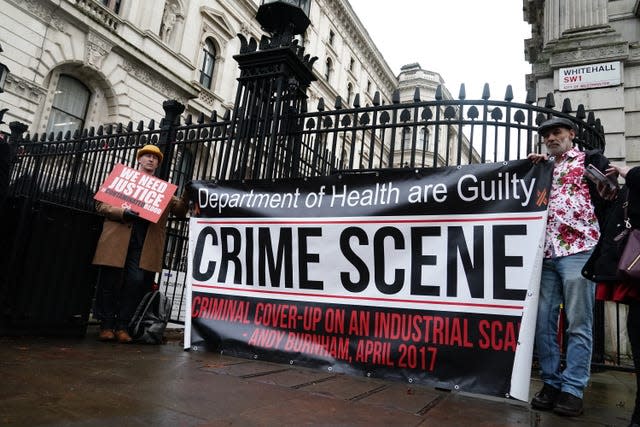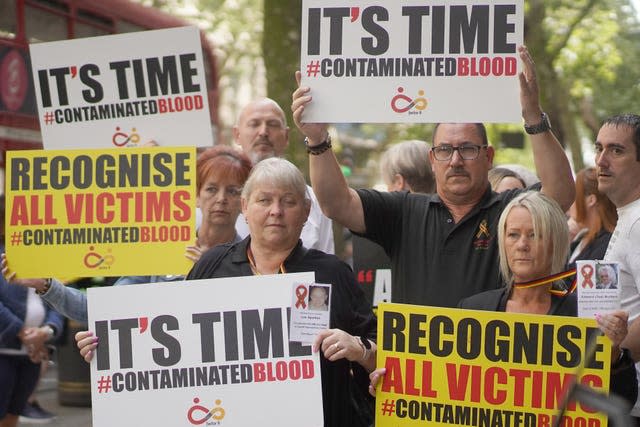Government bought cheaper blood products with higher risk, document suggests
A newly disclosed document suggests the government “was willing to endanger lives” by buying cheaper blood products more likely to be infected with hepatitis, campaigners have said.
Minutes from a telephone conversation in 1976 suggest the Department of Health was offered two forms of blood products – one with a lower hepatitis risk and a cheaper option “proven” to carry a “significantly higher risk”.
Kryobulin 1 came from European volunteers but the “significantly cheaper” option, Kryobulin 2, came from US donors who were paid as an incentive to give blood, campaigners said.
The Infected Blood Inquiry is due to release its final report in May on how thousands of people died in the UK after developing HIV and hepatitis C through infected blood products given in the 1970s and 1980s, a large number of which were imported from the US.

The minutes dated in November 1976 are between medics at a former Austrian pharmaceutical company Immuno AG, which manufactured and sold Kryobulin to buyers including the Department of Health, the infected blood scandal campaign group Factor 8 said.
Jason Evans, director of the organisation which disclosed the document, said it shows “a damning display of both state and corporate negligence”.
The memorandum states: “Kryobulin 2 will be significantly cheaper than Kryobulin 1 because the British market will accept a higher risk of hepatitis for a lower-priced product.
“In the long term, Kryobulin 1 will disappear from the British market.”
Mr Evans said: “These revelations are nothing short of shocking.
“The British government, entrusted with the health and well-being of its citizens, was willing to endanger lives to obtain cheaper blood products.
“The disclosure of this document, revealing a callous disregard for human life in favour of cost savings, is a damning display of both state and corporate negligence – I am not surprised that many in our community consider this to be murder.
“It is a stark reminder of the devastating consequences of prioritising profit over people.
“The Infected Blood Inquiry has painstakingly unravelled the layers of deception, negligence and incompetence that led to this scandal. Now, with the final report imminent, the Government must not stall on delivering justice.
“It is unconscionable that two-thirds of families affected by this catastrophe have yet to receive any redress.
“Rishi Sunak’s delay in addressing this issue is unacceptable and only adds insult to injury for those already enduring immense hardship.”

Another document dated November 11 1976 also suggests the Government had a “preference” for “lower priced” blood products.
It has been submitted to the inquiry and states: “It is possible to sell Factor VIII concentrates produced from plasma of US origin at lower prices than European based material.
“Because of the preference in the UK market for this lower priced material, we also wish to make it available.
“Packs of Kryobulin from alternate source material will be of a clearly distinguishable colour eg blue as compared with present red.
“We will continue to make available European as well as the proposed new concentrate derived from American Plasma.”
Many who died during the scandal had the blood-clotting disorder haemophilia and were given injections of Factor VIII blood products, of which Kryobulin was a brand.
Other documents shared by Factor 8 suggest Immuno AG repeatedly cut the price of the US Kryobulin for the NHS, from 7.5p per unit in October 1980 to 6p in April 1982.
Immuno AG was bought by US-based Baxter International, which has since been acquired by Takeda Pharmaceuticals.
A spokesperson for Takeda said: “We have the greatest sympathy with the individuals and families who have been impacted by infected blood.
“We fully recognise the importance of the inquiry and have cooperated with the inquiry, aiming to assist in its investigation as far as we are able by trying to provide historic information in relation to the companies concerned.
“We will continue to remain fully engaged with the inquiry.
“Above all else, Takeda are committed to the safety and quality of our medicines. We have strict standards and procedures in place, and for plasma derived therapies specifically this includes rigorous donor selection, extensive plasma testing and pathogen reduction, all in full compliance with international regulatory and industry standards.
“It would not be appropriate for us to provide further comment at this time given the independent inquiry’s work finalising its report remains ongoing, and we welcome the full report that is due to be published next month.”
The Government has been approached for comment.
